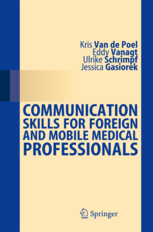Communication tips by Nursing on the Move.
 Are you a professional or a pre-professional?
Are you a professional or a pre-professional?
Do you use a second or foreign language at work?
Do you have a friend who speaks a foreign language at work or has a cultural background different from colleagues/customers?
Improve your directive skills by trying the following tips:
The communication may require some directive skills.
Directive skills are powerful tools in medical interaction. They include asking questions, asking for clarifications, providing a rationale and signposting.
Part 1: Open questions
Consultations commonly involve asking questions and gaining information. Using different question types may facilitate the consultation and affect the type and amount of information the patient will provide when replying. There are three main question types: open questions, directed questions and closed questions.
Asking the right question at the right time will simplify the process of consulting with patients. A good consultation follows a particular technique called the open-to-close cone of questioning. A good general strategy for gathering information from patients is to start with open-ended questions and move towards more focused and closed-ended questions.
Open questions are general questions, giving the patient a lot of freedom to choose how to respond. It is important to use open questions when exploring a new problem. They give patients the opportunity to reflect and think, and to tell a story about the problem they are experiencing.
An example how to formulate an open question is:
– ‘Tell me …’
- ‘Tell me about …’
(Next month: Part 2 of Types of questions and when to use them: Directed questions)
You can find an overview of all communication tips by Communication for Professionals here.
Communication Skills for Foreign and Mobile Medical Professionals
van de Poel, K., Vanagt, E., Schrimpf, U., Gasiorek, J.
„Around the world, the number of internationally mobile medical professionals is steadily increasing, posing potential difficulties for the good communication with patients and colleagues that is vital to satisfactory outcomes and personal professional success. Communication Skills for Foreign and Mobile Medical Professionals is an evidence-based communication resource book designed for all medical professionals who work in foreign countries, cultures, and languages. It offers a wealth of insights into doctor-patient communication, structured around the different phases of the consultation…Shop the book.“
Physician Attire in the Intensive Care Unit and Patient Family Perceptions of Physician Professional Characteristics
by Selena Au, MD; Farah Khandwala, MSc; Henry T. Stelfox, MD, PhD
„Physician attire is a modifiable factor that has been demonstrated to influence the patient-physician relationship. However, patient-physician interactions in the intensive care unit (ICU) differ from other health care settings. Patients admitted to the ICU typically do not have a preexisting long-term relationship with their ICU physician, and therefore trust needs to be established over a short time frame.The severity of patient illness frequently results in the active participation of family as surrogate decision makers, complicating the patient-physician relationship.“ Read this article.
Tip: More up to date educational events dealing with communication for doctors and health professionals can be found online in the Education Database »medicine & health«.
